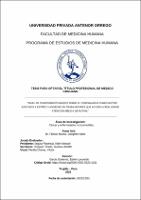Nivel de conocimiento básico sobre el coronavirus como factor asociado a estrés o ansiedad en trabajadores que acuden a realizarse atención médica de rutina

View/Open
Download
(application/pdf: 621.1Kb)
(application/pdf: 621.1Kb)
Date
2022Author(s)
Florian Muñoz, Dangello Nahir
Metadata
Show full item recordAbstract
Objetivo: Identificar si el nivel de conocimiento básico sobre el coronavirus es un factor asociado a estrés y ansiedad en trabajadores que acuden a realizarse atención médica de rutina a la clínica de salud ocupacional “Euroclinic”.
Materiales y métodos: Se realizó un estudio transversal analítico a través de una encuesta virtual en la plataforma “Google Forms”; la muestra constó de 317 trabajadores. La variable exposición se obtuvo aplicando la escala KNOW-PCOVID-19, y las variables resultado, con la escala DASS-21. Se obtuvieron las frecuencias y porcentajes para las variables categóricas, posteriormente se aplicaron las pruebas chi cuadrado para estas variables. En cuanto a las variables cuantitativas, se realizó la prueba U de Mann-Whitney. Finalmente, se realizó un análisis multivariado a través de modelos lineales generalizados.
Resultado: Un 20.2% y 27.1% de los trabajadores presentaron estrés y ansiedad respectivamente. El nivel adecuado de conocimiento básico mostró asociación con estrés (RPa: 0,475; IC95%: 0,332-0,678; p<0,001) y ansiedad (RPa: 0,364; IC95%: 0,242-0548; valor p<0,001). En el análisis multivariado, el género masculino, tener solo primaria completa, estado civil, lugar de procedencia, ser administrativo, ser obrero y los años de trabajo mostraron asociación con el estrés; por otro lado, tener solo primaria completa, ser divorciado y ser de la costa mostraron asociación con la ansiedad.
Conclusiones: Los trabajadores con un nivel adecuado de conocimiento básico sobre coronavirus presentan menor probabilidad de tener estrés o ansiedad. Objective: To identify whether the level of basic knowledge about the coronavirus is a factor associated with stress and anxiety in workers who attend routine medical care at the “Euroclinic“ occupational health clinic.
Materials and methods: An analytical cross-sectional study was carried out through a virtual survey on the “Google Forms“ platform; the sample consisted of 317 workers. The exposure variable was obtained by applying the KNOW-PCOVID-19 scale, and the result variable, with the DASS-21 scale. Frequencies and percentages for categorical variables were obtained, then chi-square tests were applied to these variables. Regarding the quantitative variables, the Mann-Whitney U test was performed. Finally, a multivariate analysis was performed through generalized linear models.
Results: 20.2% and 27.1% of the workers presented stress and anxiety, respectively. The level of basic knowledge was associated with stress (PRa: 0.475; 95% CI: 0.332-0.678; p<0.001) and anxiety (PRa: 0.364; 95% CI: 0.242-0548; p<0.001). In the multivariate analysis, male gender, having only completed primary school, marital status, place of origin, being administrative, being a worker and years of work showed association with stress; on the other hand, having only completed primary school, being divorced and being from the coast were associated with anxiety.
Conclusions: Workers with an adequate level of basic knowledge about coronavirus are less likely to have stress or anxiety.
Subject
Collections
- Medicina Humana [3196]

